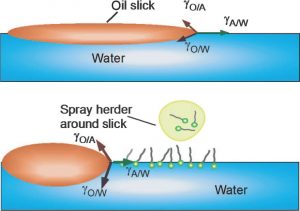Study: Eco-Friendly Oil Herders Show Promise for Effective Marine Spill Cleanup
– August 26, 2015
Scientists demonstrated an effective and environmentally benign technology to harness the forces that cause an oil spill to spread.
Researchers from the City College of New York and Tulane University developed chemicals from a biomolecule abundant in marine algae that reversed the direction of the spreading force when applied to the surrounding edge of oil on water. In laboratory experiments, the floating oil contracted into a smaller and thicker mass. This development may help responders more effectively remove oil in the event of a future spill. The team published their findings in Science Advances: Sacrificial amphiphiles: Eco-friendly chemical herders as oil spill mitigation chemicals.
During a spill, the water’s large surface tension pulls the slick at its periphery and causes the oil to spread very thin; this process is further aided by wind and waves. The oil quickly reduce its thickness to a few millimeters or less and appears as a light brown or metallic sheen. At this point it is too thin for burning.
Oil from the Deepwater Horizon spill that reached the sea surface exhibited similar behavior, making it difficult for responders to rapidly contain or remove it. Ecological concerns about the influx of oil and gas were compounded by large amounts of potentially toxic chemical dispersants that lingered in the water column. Though the dispersants reduced the amount of coastline oiling and enhanced microbial oil degradation, the incident highlighted the need for effective, eco-friendly spill remediation methods for off-shore and other marine environments, such as the artic or rivers and bays that have low/no wave action, where existing commercial dispersants are not as effective.
This study’s team coupled a phytol molecule (the hydrophobic part of the herding amphiphile) with a “cation” (the polar group of the amphiphile that has a small positive charge). The cation anchors the molecule to the water surface, forming a single layer that reduces tension. In small pan experiments, the researchers spread Louisiana sweet crude oil on water and applied phytol-based amphiphiles. They evaluated herding behavior as a function of time, temperature, and water salinity.
The phytol-based molecules retracted the surface oil and made it thicker by 500%, 700%, and 2,500% at 5°, 20°, and 35°C, respectively, during the first ten minutes of the experiment, rates similar to silicone herders. The phytol-based herders completely biodegraded within a month, which is an advantage over silicone-based herders. Salinity did not significantly affect the herding effectiveness.
Chemistry Professor George John explained why this technology advances spill remediation, “The key to designing effective chemical herders is to build molecules that effectively lower the tension while staying on the surface and keeping the tension low by not dissolving into the water column.” “In this way,” John continues, “these molecules have enough time to sufficiently contract the spill so it can be burned.”
Chemical Engineering Professor Charles Maldarelli explained the bio-friendly aspect of these molecules, “They are designed to break-up on the surface after they have herded the oil, releasing the phytol back into the biome and the cation into the water where it becomes diluted.”
Compared with existing commercial dispersants, smaller amounts of chemical herders would be used as it is applied only to the spill periphery. John said, “These phytol-based herders are new, effective, green molecules in the arsenal to combat an oil spill and can bring chemical herding to the forefront of environmentally benign remediation tools in the advent of a maritime accident.”
John described the research on these chemical herders as “an exemplary collaborative effort between chemists and engineers.” Co-author and Chemical Engineering Professor Vijay John commented, “The technology is amongst those being developed by the Consortium for the Molecular Engineering of Dispersant Systems (C-MEDS) and is a very useful contribution to the science of amphiphilic molecules that can be used as dispersants or as chemical herders in mitigating the effects of oil spills.”
The team noted that while the results are promising, additional research is needed before these molecules can be deployed in response to an oil spill. This group’s current research focuses on detailed assessments of the herders’ decomposition products, toxicity of the water soluble degradation products, understanding the factors that govern how long the herding action is retained, and modeling the effectiveness of the herding process during wind and wave action.
The study’s authors are Deeksha Gupta, Bivas Sarker, Keith Thadikaran, Vijay John, Charles Maldarelli, and George John.
************
This research was made possible in part by a grant from the Gulf of Mexico Research Initiative (GoMRI) to the Consortium for the Molecular Engineering of Dispersant Systems (C-MEDS). GoMRI is a 10-year independent research program established to study the effect, and the potential associated impact, of hydrocarbon releases on the environment and public health, as well as to develop improved spill mitigation, oil detection, characterization and remediation technologies. An independent and academic 20-member Research Board makes the funding and research direction decisions to ensure the intellectual quality, effectiveness and academic independence of the GoMRI research. All research data, findings and publications will be made publicly available. The program was established through a $500 million financial commitment from BP. For more information, visit https://gulfresearchinitiative.org/.
© Copyright 2010- 2017 Gulf of Mexico Research Initiative (GoMRI) – All Rights Reserved. Redistribution is encouraged with acknowledgement to the Gulf of Mexico Research Initiative (GoMRI). Please credit images and/or videos as done in each article. Questions? Contact web-content editor Nilde “Maggie” Dannreuther, Northern Gulf Institute, Mississippi State University (maggied@ngi.msstate.edu).






